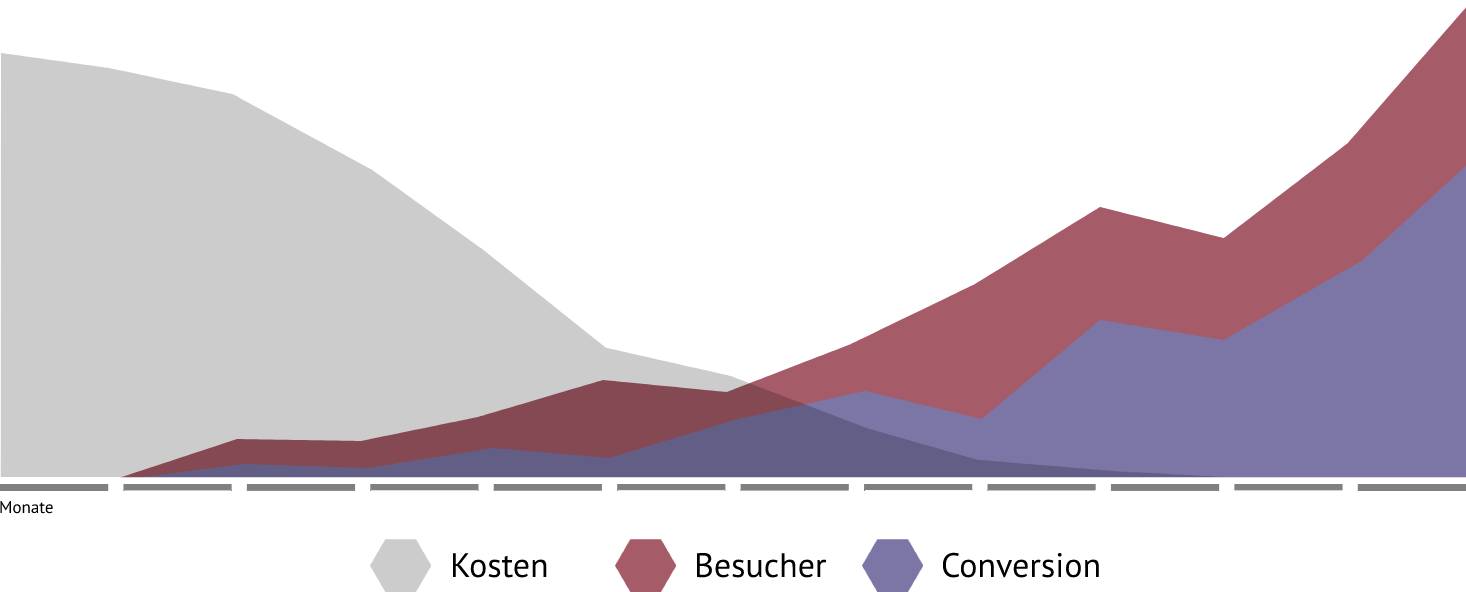
Cannabis SEO
High on google
Our experience has made us SEO experts for cannabis stores and websites.
Our strategic approach aims to bring your company’s website to the top of search engines such as Google and Bing and anchor it there.

Search engine optimization (SEO) for cannabis brands
Your website can be as good as it is, but sales won’t increase if customers can’t find you. We use a variety of tools to track the progress of your website over time and use both off-page and on-page tactics to keep your online store at the top of Google’s rankings.
Perfectly tailored SEO for measurable success
We start with an SEO audit to determine basic metrics and fix SEO-related issues, followed by comprehensive competitive research and analysis to determine your ranking for relevant keywords and phrases.
Based on this research, we implement a campaign strategy to drive as much high-quality traffic as possible to your website.
How long does SEO for online stores take?
Search engine optimization is a lengthy but also sustainable process. The optimizations and innovations to a homepage or online store must first be indexed by Google.
The first measurable results are obtained after 6-12 months, depending on various factors.

In order to appear at the top of the search results as quickly as possible, we can alternatively or additionally take SEA measures and place advertisements (Google Ads).
Simply contact us and we will give you comprehensive advice.
Cannabis SEO services
Depending on your product or your skills, we will develop a customized marketing strategy for you. This can consist of the following services:
Store performance
When it comes to the marketing strategy for cannabis products, we start by reviewing your store performance and defining the most important web vitals. Key aspects such as loading times, interactive elements and visual stability of the site are optimized to guarantee a smooth user experience.
If the store system is outdated, we can replace it with a modern and scalable system. Our development team specializes in WordPress and can use its in-house theme to create lightning-fast, custom homepages and online stores that are optimized specifically for the cannabis industry.
Cannabis keyword research
Cannabis SEO is very specific. There are many search queries to cover that your potential customers are using to find out more about hemp and its potential. Most of them are looking for a solution to a specific health problem, while others may have questions and concerns about cannabis products. To give them the answers, free them from their doubts and convince them that your products are the best fit, we will select the right keywords and provide them in relevant content.
We segment users “search queries according to keywords that can be won quickly and with low competition, match them with the users” intentions and create or optimize your content.
Content management / writing cannabis content
There is no effective cannabis SEO strategy without first-class content. In addition to other ranking factors, the behavior of your users is another indicator of the quality of your content.
We know how to maintain this balance and create content that will be ranked by Google and lead your users to the bottom of the sales funnel.
Local SEO for cannabis brands
Since almost half of all Google searches are aimed at finding a local business, incorporating location-based keywords into your content is essential. This is another way for your business to get noticed by interested users.
We can help you improve your local search engine rankings and conversions.
Cannabis meta data
Your metadata is another way for Google to index your web pages appropriately and match them with user queries. Since we know the best SEO practices, we can create meaningful and catchy meta tags for your blog articles and other pages.
Conversion optimization
Even if your SEO strategy is properly organized, conversion rates can drop. In this case, the reason is most likely hidden in the technical aspects of the website. Maybe your website has minor flaws in the design and user interface, maybe the page takes too long to load, or the user encounters other obstacles that prevent them from completing the intended action.
In this case, it is necessary to analyze the user journey, find stumbling blocks and show shoppers a way to a seamless user experience.
Affiliate systems
Affiliate marketing is a promising approach to cannabis advertising, as affiliate websites offer the opportunity to inform users and sell them the right products at the same time.
With your own affiliate program, your online store will rapidly gain new customers and sustainable backlinks. The profit that awaits the user of your affiliate program is an additional incentive to create high-quality content about your products.
To support you in this task, we use our expertise in cannabis SEO, affiliate program reachability and management, link building and SEO-focused content creation.
Does a cannabis store need SEO?
Yes, absolutely. Since the promotion of cannabis is strictly prohibited, you have almost no other option. Through targeted SEO measures, your online store can grow organically, attract more qualified traffic and ultimately increase sales.
Current SEO topics
Guide to a successful cannabis SEO strategy
Here’s a detailed guide on how to develop an effective SEO strategy for your online cannabis store.
Market analysis and understanding of target groups
Start with a thorough analysis of the market. Understand the current trends, legal framework and competitive landscape. Identify your target group precisely – who are they, what are they looking for and how do they behave online?
Demographic characteristics
Determine the demographic characteristics of your target group, such as age, gender, income and education level. This will help you to tailor your SEO and content strategy to the needs and preferences of this group.

Psychographic characteristics
Go beyond basic demographic data and look at the psychographic aspects of your target group. This includes values, attitudes, interests and lifestyles. Understanding what motivates your customers and how they spend their free time can significantly enrich your content strategy.
Analyze purchasing behavior
Investigate how and where your target group makes purchases. Which online channels do they use? How do reviews and recommendations influence their purchasing decisions? This knowledge is crucial to effectively align your SEO strategy.
Identifying needs and challenges
What are your target audience’s main concerns and challenges related to cannabis? Understand their pain points and how your products or services can help solve them.
Feedback and interaction
Use social media, customer surveys and feedback tools to learn directly from your target group. This provides direct insights into their preferences and opinions.

Keyword research and optimization
Keyword research and optimization is the foundation of any successful SEO strategy, especially in a specialized market like the cannabis sector. Effective use and placement of keywords can significantly increase the visibility and reach of your website. Here are some advanced steps and techniques to deepen these processes:
Use of advanced keyword tools
In addition to standard tools such as the Google Keyword Planner, there are advanced instruments such as SEMrush, Ahrefs or Moz, which provide deeper insights into search trends and competitor analyses. These tools not only help to identify relevant keywords, but also to understand their competitiveness and potential traffic contributions.
Consideration of the search intention
Understand the intent behind the search queries. Keywords can be divided into different categories: Information-oriented (e.g. “How is CBD oil made?”), navigation-oriented (e.g. “cannabis store in Berlin”) or transaction-oriented (e.g. “buy CBD oil”). Each of these categories requires a different approach to content creation and website structuring.
Use long-tail keywords
Long-tail keywords are longer, more specific search phrases that often have a lower competition density but a higher conversion rate. For example, “organic CBD oil for sleep disorders” could be a valuable long-tail keyword that appeals to a specific target group.
Local keywords for local visibility
If your cannabis business is regionally focused, local keywords should not be neglected. Local search terms like “CBD Shop Munich” (lol) can be crucial for local businesses.
Integration of synonyms and related terms
Nowadays, search engines are able to recognize synonyms and thematically related terms. Integrate synonyms and related terms into your content to increase its naturalness and readability while expanding your reach.
Continuous keyword optimization
SEO in the cannabis market is not a one-off project, but a continuous process. Monitor the performance of your keywords regularly and adjust them if necessary to react to changes in the market and in search algorithms. The tools mentioned above are very useful for this.
Integration of keywords into your website
After the research, the careful integration of keywords into your website is crucial. This includes not only text content, but also meta tags, ALT attributes of images, URLs and headings. Make sure that the keywords are embedded naturally and contextually.

High-quality and relevant content
At the heart of any successful SEO strategy is the creation of high quality and relevant content. Especially in cannabis marketing, it is crucial to produce content that is both informative and engaging. Here are detailed approaches and ideas to take your content to the next level.
Create comprehension-oriented content
The aim is to create content that is easy to understand and accessible. Complex topics such as the effects of different cannabis strains, changes in the law or the correct dosage should be explained in simple language. Use clear examples, infographics and step-by-step instructions to make complicated issues tangible.
Storytelling in cannabis marketing
An effective way to connect emotionally with your audience is through storytelling. Tell stories of people who use cannabis for medical reasons or share experiences of recreational users. Such personal narratives can make your content more authentic and engaging.
Expert interviews and guest contributions
Integrate interviews with experts from the cannabis industry or guest contributions from renowned authors into your content strategy. This not only increases the credibility of your content, but also offers diverse perspectives and deeper insights into the industry.
SEO-optimized product descriptions
When describing cannabis products, it is important to combine SEO optimization with informative and convincing texts. Make sure that your product descriptions contain both the most important keywords and provide all relevant information about the product.
Addressing current topics
Always keep your finger on the pulse. Cover current topics and trends in the cannabis industry in your content. This shows that your store is up-to-date and can help your website rank in search results for current search queries.
Answer user questions
Create content that answers frequently asked questions from your target group. Use platforms such as social media or forums to understand what questions and concerns your target group has and address these in your content.
Integrate interactive elements
Interactive elements such as surveys, quizzes or interactive graphics can increase user loyalty and make your content more attractive. They also offer an excellent opportunity to collect feedback and learn more about your target group.
On-Page SEO
Effective on-page SEO is crucial to improving a cannabis marketing agency’s visibility and ranking in search engines. Here are some advanced strategies and techniques to optimize your on-page SEO:
Headline structure and clarity
Make sure that every page of your website has a clear H1 tag that summarizes the main topic. This tag should contain the main keyword and be clear and informative for search engines and users alike.
Use H2 and H3 tags for subheadings to make your content structured and reader-friendly. This helps both users and search engines to better understand the content of your page.
Content optimization for relevance and quality
Make sure that the keywords are integrated naturally into your text. You should avoid overloading your text with keywords (keyword stuffing), as this can lead to a negative evaluation by search engines.
Your content should be informative, interesting and relevant for your target group. High-quality, well-researched content is preferred by search engines and promotes user engagement.
Optimization of meta tags and descriptions
Each page of your website should have a unique meta title and meta description that contains the main keyword and accurately reflects the content of the page.
Meta descriptions should be appealing and informative in order to generate clicks from the search results.
Technical aspects and user experience
As more and more users access the internet via mobile devices, it is important that your website is optimized for mobile devices. A responsive website ensures a good user experience across all devices.
Fast loading times are crucial for the user experience and SEO ranking. Optimize images, use caching and check your hosting provider to minimize loading times.
Internal linking and navigation
Use internal linking to connect relevant content on your website. This helps search engines understand the structure of your website and distributes PageRank capital across your pages.
Clear and intuitive navigation helps users to find their way around your website and improves the length of stay and interaction rate.
Updating and expanding content
Keep your content up-to-date and relevant. Regular updates signal to search engines that your website is active and always provide users with fresh and relevant information.
By implementing these on-page SEO strategies, you can improve the visibility of your online store or website in search results, generate more qualified traffic and ultimately strengthen your online business.

Receive up to €17,500 from the state now!
If you need support with the implementation of your Zile, we can help you and get our work funded. Our DAO is an authorized consultant and can apply for additional funding from the current funding programs, such as BAFA and go-digital. In addition, we can provide access to regional fundings.
So we can boost the budget and add further marketing solutions to the service package virtually free of charge.
Off-page SEO and backlinks
Off-page SEO plays a crucial role in any SEO strategy, especially in the specialized field of cannabis marketing. Here’s how to effectively design and optimize your off-page SEO and backlink strategy.
Backlink building: quality before quantity
Focus on backlinks from websites that are considered authoritative and trustworthy in the cannabis industry. This can include industry blogs, news portals or leading cannabis magazines.
Establish partnerships with relevant websites and offer to write guest posts. This is a great way to generate high-quality backlinks and increase your expertise and brand awareness at the same time.
Since AI will take over content creation in the future and this can be used less as a factor for Google, Banklink “(continues) to be a simple and good way to measure the relevance of a page.
Social media engagement
Use social media platforms to share your content and interact with your target group. Although social media links are mostly “nofollow”, they help to increase brand awareness and website traffic.
Work with influencers who are active in the cannabis community. They can introduce your brand to a wider audience and indirectly contribute to backlink generation.
Business directories and local listings
Use business directories to list your website. This not only helps with backlink generation, but also improves your local visibility.
For local cannabis businesses, an optimized Google My Business profile is essential. It improves local searchability and provides potential customers with important information such as location, opening hours and customer reviews.
Community engagement and forums
Get involved in online communities and forums that deal with cannabis issues. Participate in discussions and share useful information to strengthen your presence.
If it is natural and relevant, you can include links to your own content in discussions. Make sure that this is done in a value-oriented way and is not perceived as spam.
Monitoring and analysis
Use previously mentioned tools such as Ahrefs or SEMrush to monitor your backlink profile. Pay attention to the quality of the links and remove bad backlinks that could harm your ranking.
Observe how the backlinks affect your website traffic and your ranking. Use these findings to continuously improve your strategy.
Local SEO (if applicable)
Local SEO is a crucial aspect of being visible and discoverable in the local cannabis industry. Here are some advanced steps and tips on how to optimize your local SEO strategy:
Optimize Google My Business
Make sure that your Google My Business profile is complete and up-to-date. This includes accurate address details, opening hours, contact information and a description of your services.
Post regular updates, offers or events on your Google My Business profile to show topicality and commitment.
Visual elements such as high-quality photos of your business or products and videos can increase engagement and make your profile more attractive.
Use local keywords
Identify local keywords that potential customers in your region use. For example, “cannabis store Berlin”.
Integrate these local keywords into your website, including title tags, meta descriptions, content and URLs.

Ratings and reviews
Encourage satisfied customers to leave reviews on Google, Yelp and other relevant platforms. Respond professionally to all reviews, both positive and negative.
Display positive customer reviews on your website to build trust and credibility.
Build local backlinks
Work with local businesses, blogs and media to generate backlinks.
Get involved in local events or sponsorships to get mentions and backlinks from local organizations and events.
Create local content
Create blog posts or landing pages that relate to local events, laws or cannabis trends in your region.
Show your connection and involvement in the local community by highlighting local stories or partnerships.
Mobile optimization
Make sure your website works well on mobile devices, as many local searches are made from smartphones.
Optimize your website for fast loading times to improve the user experience on mobile devices.
Use of local directories
List your business in local online directories to strengthen your local presence.
Make sure that your contact details are consistent across all platforms.
Analysis and adaptation
In the dynamic environment of cannabis marketing, it is crucial to continuously analyze and adjust the SEO strategy. Here are detailed steps and considerations to make this process effective.
Data analysis: the core of every SEO strategy
Constantly monitoring and analyzing website data is essential. Tools like Google Analytics offer deep insights into user behavior on your site. Pay attention to important metrics such as:
- Traffic sources: Where do your visitors come from? Are they organic searches, direct visits or referrals from other sites?
- User engagement: How long do users stay on your site? Which content is particularly appealing?
- Conversion rates: How many visitors perform the desired actions, such as inquiries, downloads or purchases?
Target-oriented adjustments
Based on your analyses, make targeted adjustments. If certain pages or content are not performing as desired, think about how you can improve them. Perhaps they need more appealing titles, better content or stronger calls-to-action.
SEO trends and market changes
The cannabis market and SEO landscape are constantly changing. Keep up to date with the latest trends and algorithm updates. This could mean integrating new keywords, responding to changing user intentions or strengthening your mobile search strategy.
A/B testing
Use A/B testing to optimize different aspects of your website. Test different versions of headlines, images or page layout to find out what works best.
Actively gather user feedback
In addition to quantitative data, qualitative user feedback is invaluable. Use surveys, feedback forms and social media to get direct feedback from your target customers. This can help you to further improve the user experience.
Continue competitive analysis
Keep an eye on your competitors and regularly analyze their strategies. This will help you to strengthen your own positioning and learn from successful tactics.
Flexible strategy development
Remain flexible in your approach. If you find that certain aspects of your strategy are not working as expected, be prepared to adapt quickly and test new approaches.
Long-term perspective
SEO is a marathon, not a sprint. It is important to have a long-term perspective and to continuously work on improving your SEO strategy. Patience and perseverance pay off here.
Compliance and ethical considerations
Observing compliance and ethical considerations in cannabis marketing is not only a question of legality, but also of trust and credibility. To develop a successful and sustainable SEO strategy for your cannabis store, the following aspects are crucial:
Legal conformity
Find out about the current laws and regulations relating to cannabis in the regions in which you operate. This includes advertising guidelines, sales restrictions and information requirements.
Cannabis laws vary widely from country to country and even within countries. Make sure your content and SEO practices are compliant in every region you operate in.
Ethical advertising practices
Avoid misleading or exaggerated claims about the benefits of cannabis products. Stick to scientifically proven information and be transparent about possible risks and side effects.
Target your marketing and SEO efforts to adult consumers. Avoid content that could appeal to teenagers or children.
Data protection and user security
Make sure that your website complies with data protection regulations, especially when it comes to the collection and processing of user data.
Implement security measures such as SSL certificates to protect your website visitors’ data and increase trust.
Social responsibility
Use your platform to educate people about safe consumption, health aspects and social responsibility in connection with cannabis.
Commit yourself to issues such as sustainability, social justice and the destigmatization of cannabis. Show that your company is making a positive contribution beyond the commercial aspect.
Long-term credibility
Long-term success in the cannabis industry is based on trust and credibility. Make sure your SEO strategy reflects these values.
If applicable, be honest about the origin of your products, the manufacturing processes and the company values. Transparency promotes trust in your brand.
Why an SEO expert is indispensable
Given the complexity and constant developments in the field of SEO, especially in the specialized cannabis market, it is clear that the effective implementation of an SEO strategy requires extensive expertise and continuous attention. This is where the role of an experienced SEO expert like Ingo Lembke plays a crucial role.
Contact person for SEO
SEO is a dynamic field with constantly changing algorithms and best practices. Ingo Lembke not only has the necessary expertise, but also the experience to navigate these challenges effectively.
As a graphic and web designer with programming experience, he also advises on a technical and design level.
Contact
0157 37 58 57 35 // hi@420mkt.com

The cannabis market has its own unique challenges, especially when it comes to compliance and ethical marketing practices. An expert like Ingo Lembke understands these nuances and can develop an SEO strategy that is both effective and compliant.
SEO requires a significant investment of time and resources. By outsourcing SEO work, you can focus on other areas of your business while ensuring that your online presence is handled professionally.
An SEO expert always has his finger on the pulse when it comes to trends and changes in search engine marketing. Ingo Lembke can proactively make changes and adapt your strategy to always achieve the best results.
An experienced SEO consultant not only plans for short-term success, but also develops strategies for the long-term growth and sustainability of your online presence.
FAQ
Search engine optimization (SEO) is an essential tool for increasing the visibility of your website in search results. Targeted strategies and continuous optimization can generate sustainable traffic. Below we answer the most important questions about SEO.
What is SEO?
SEO (Search Engine Optimization) encompasses all measures aimed at improving the ranking of a website in the organic search results of search engines such as Google. This includes the optimization of content, keywords, technical structure and backlinks.
Why is SEO important?
A good ranking gives websites more visibility and therefore more potential visitors. Users often rely on the first search results, which is why an optimal ranking increases the probability of clicks and therefore also conversions.
How long does it take for SEO measures to take effect?
SEO is a long-term process. Depending on the competition, industry and current website structure, it can take several weeks to months before the first noticeable successes are achieved. Continuous optimization is essential.
Which factors influence the Google ranking?
Google takes over 200 factors into account. The most important of these include high-quality content, relevant keywords, technical aspects (e.g. loading times, mobile optimization), user experience and inbound links (backlinks) from trustworthy sites.
What is the difference between on-page and off-page SEO?
On-page SEO includes all optimizations on your own website such as content, metadata and technology. Off-page SEO focuses on external factors such as backlinks, social media signals and mentions in other online media.
Why is keyword research so important?
Keywords are the terms that users use to find a website in search engines. Good keyword research ensures that the content is tailored precisely to the needs of the target group and thus achieves better findability.
What are backlinks and why are they relevant?
Backlinks are references from other websites to your own. Search engines rate these links as recommendations. High-quality, topic-relevant backlinks improve the ranking and create trust among users.
Can I perform SEO once and then forget about it?
No, SEO is a continuous process. Search engine algorithms change regularly and the competition never sleeps. If you want to stay at the top, you have to constantly optimize and provide new content.
What are the costs for SEO?
The costs vary depending on the scope of the project, competition and objectives. Some agencies work with monthly flat rates, others with project-based or hourly billing models. The decisive factor is a clear objective in order to be able to create a customized offer.
What can I do if my SEO strategy is not working?
First check all relevant factors: technical errors, on-page optimization, loading times and backlinks. Carry out a comprehensive analysis (e.g. using SEO tools) and implement targeted optimization steps. If there is no improvement after several months, it is advisable to consult an expert.
How does local SEO differ from supra-regional SEO?
Local SEO focuses on geographical factors, e.g. “dentist in Berlin”, and uses listings in directories such as Google Business Profile. Supra-regional SEO strategies tend to focus on overarching keywords and content in order to attract visitors from a larger catchment area.
How do you stay up to date with SEO?
Regular training is crucial: follow specialist blogs, Google updates and exchange ideas in SEO communities. SEO conferences and workshops help you to learn best practices and keep your strategies up to date.
What role does content marketing play in SEO?
Content marketing is a central component of SEO. High-quality, unique content increases the length of stay and increases the chance that users will recommend or link to your site, which can have a positive effect on your ranking.
Can duplicate content do harm?
Yes, duplicate content makes it difficult for search engines to determine which page is relevant and can therefore lead to lower rankings. Unique content or canonical tags for duplicate content are essential to avoid problems.
Why is mobile-first indexing important?
As more and more users access websites via mobile devices, Google primarily evaluates the mobile version of your site. A mobile-optimized site with fast loading times and good user-friendliness is therefore essential for good rankings.
How do I know if my SEO measures are successful?
Regular evaluations of rankings, organic traffic, dwell time and conversion rates provide a good overview of success. Analyses help to identify further optimization potential and continuously adapt the SEO strategy.
